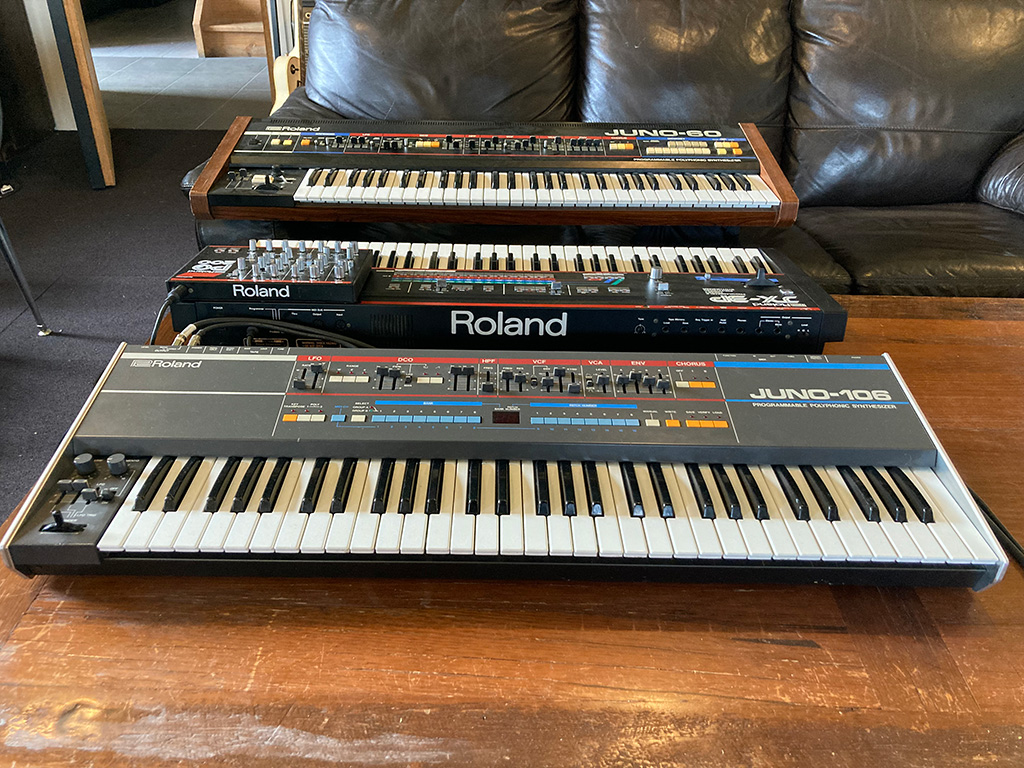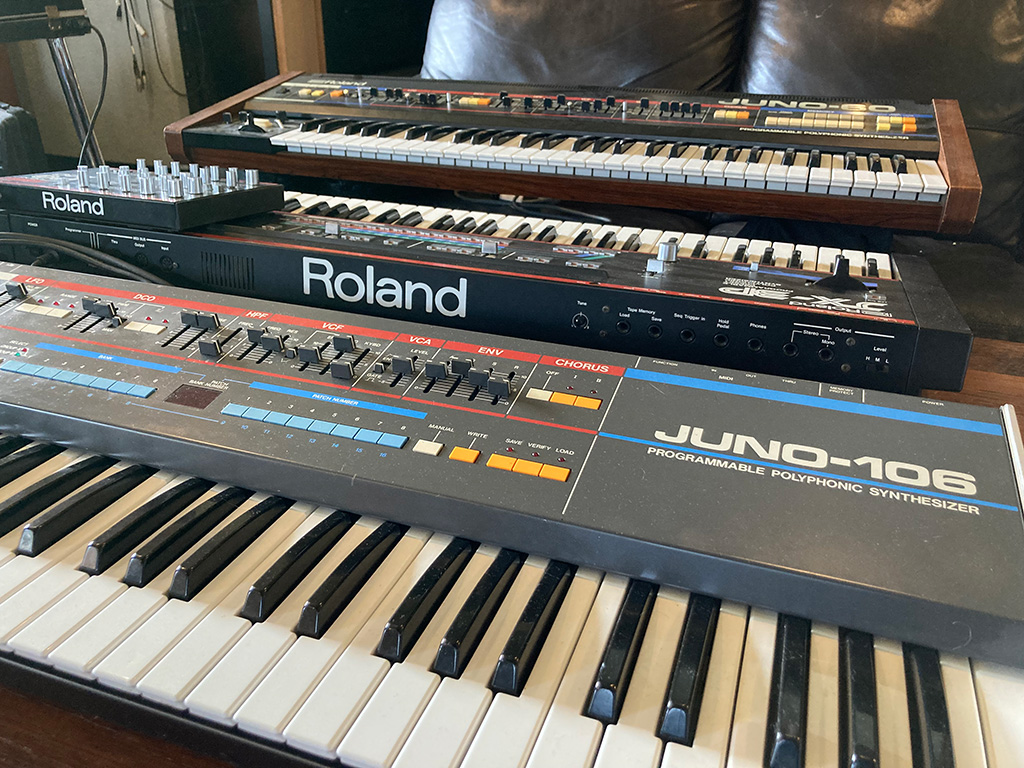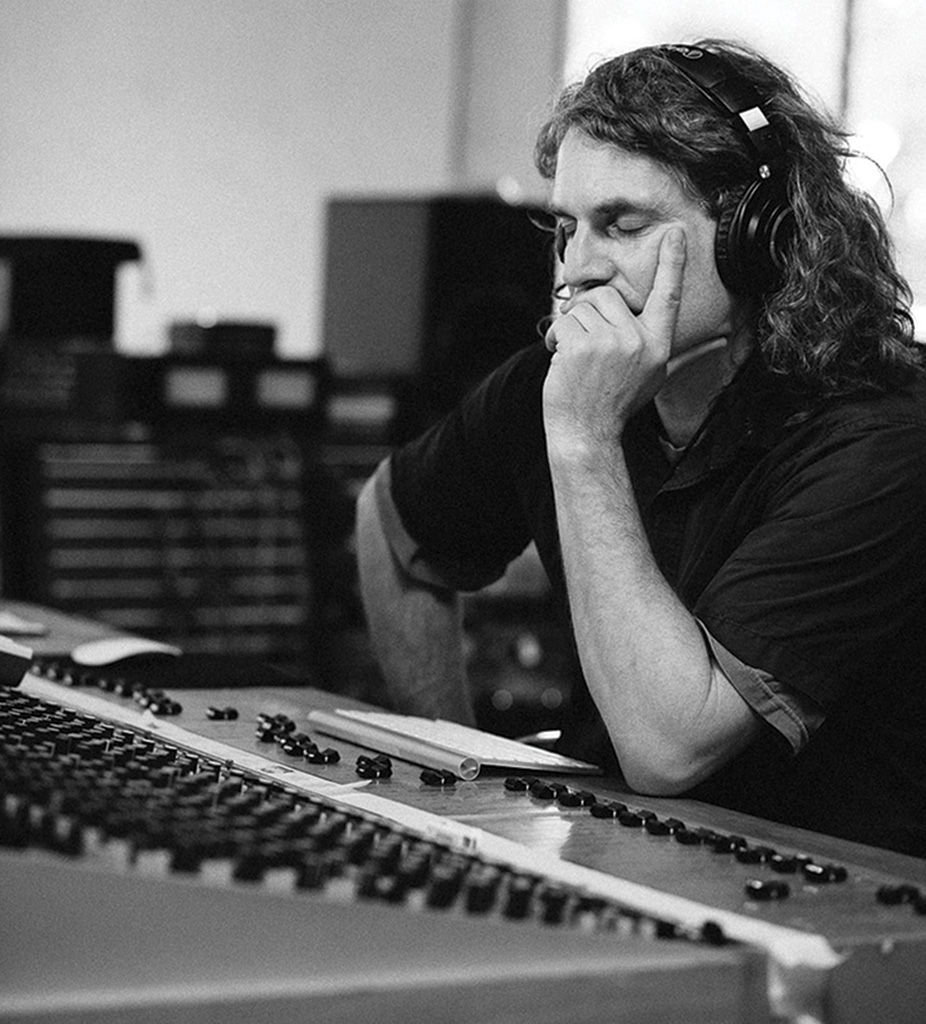Listen Here
14 Oct 2022
Listen Here: Drowning In A Sea Of Synths

Subscribe to CX E-News
Where everyone would love to drown
It doesn’t take much to get addicted to synths. Buying and collecting them can be more addictive than crystal meth, and as I’ve discovered recently, once you develop the habit for these wonky wonders, no-one in your audio fraternity will ever reign you in. The same goes for mics, guitars or preamps, frankly anything that emits, processes or busses a sound. Buying and collecting audio gear is a dangerously addictive game.
And when it comes to addiction, audio producers like me are the most susceptible amongst our human sub-species (which may one day be revealed in our DNA profiles, who knows?)
We can justify anything:
“Oh, I need that mic for a new client, whose voice matches perfectly with the tonal characteristics of this valve mic from the ’60s. No other mic seems to suit her voice, unfortunately. The brakes servicing on my car will have to wait.”
Or… “Yeah that ’70s synth sound can’t really be replicated by anything else, let alone a soft-synth. And besides, it’s the way I interact with it, the way the electronics smell, and the tactile nature of the instrument that makes all the difference.”
Sometimes I even hear myself saying things like: “Well, yeah, I’m not a great player, that’s why I need so many different sounds around me. I’m inspired by new sounds and can quickly identify what will work in a song and what won’t!”
Need I go on?
I’ll admit it. I’m currently in the grip of a synth buying frenzy (as are some of my muso mates). I want to qualify this statement already, of course, buy saying that I haven’t actually bought that many. But somehow this sounds like the addiction talking.
I’ve tried to stop myself… hell, I even bought a 12-string guitar the other day to break the habit. But it didn’t help. So then I bought a few cymbals. That didn’t work either. It seems buying other audio equipment isn’t really the solution… surprisingly.
Another insight into my addiction is my susceptibility to the opinions of total strangers. For example, just before I started writing this article, I jotted down the Top 10 list of ’80s favourites that some guy in Germany prefers. I don’t know him, I have no idea what he’s ever produced, but his opinion somehow matters right now.
As I say, I’m not well.

So what is this all about really?
I am, in all honesty, quite torn between the need (or desire) to hear new sounds, and the reluctance to build another building next door to house all this crap! I’m currently drowning in keyboards: some of which I’ve had for decades, some are old ’70s and ’80s icons that I’ve recently acquired, while others are brand new. I even have a pile of busted ones that I can’t seem to turf.
The problem is that no amount of purchasing seems to sate my so-called ‘need’ to add new sounds to my production arsenal. Indeed, the more I delve into the world of hardware synthesis, the more addicted I become. For example, I recently bought an old Juno 106 to have that old familiar ’80s string sound at my fingertips. But has it provided me sonic-pad contentment? No (although I have used it on a few recordings already.) On the contrary, now I seem hell-bent on acquiring every synth that ever uttered a sound similar.
I certainly don’t ‘need’ all of them for work, that’s clear. I don’t need a Roland Juno 106 plus a Juno 60, plus a JX-3P and an JX-8P. Nor can I afford all of them anyway, even if I could justify them, which I can’t.
Drawing The Line
When it comes to audio equipment, I’ve had enough experience of the industry by now to know that we’re all susceptible in some way to wanting stuff either because it sounds great, looks great, feels great, or gets the job done.
The problem is that there’s no line we cannot cross; no amount of gear that is too much gear. For instance, who among us would say that 10 mics is too many? If you’re recording bands in the studio, maybe it’s 20. Maybe it’s 50. And how many guitars or synths is too many, particularly if you’re a producer or an exceptional musician? Is it three or 300? I once visited Bill Joe Armstrong’s studio of Green Day fame and he had about 600 guitars! But did I think that was too many… well, it crossed my mind, but in the end, no. I thought not.
That’s why we all frequently see so many pictures of the best studios, producers, musos and engineers surrounded by their respective hoard of gear, like cool cave trolls or Smaug. We rarely see audio gurus pictured with one synth or a single guitar, one preamp or a cheap microphone… it’s always dozens.
And like all these candidates inadvertently vying for Most Addicted Audio Hoarder of 2022, we all want more gear, more sounds, more facilities, more plug-ins, more guitars… but no matter how much stuff we acquire, there will always be thousands of other pieces of Aztec Gold buried somewhere for us to dig up.
So where do we draw our own line, and frankly, who among us wants to?
Well, I think, in the end, we’ve all got to realise that there’s a tipping point, over which we cease to be the person we once identified with.
For instance, you might have been a music producer at some point, but maybe now you’re just a collector. Do you use all the gear you buy, or do you just boast about owning it at dinner parties? Maybe you were a great musician once upon a time, but perhaps now you’re just another struggling studio owner.
Speaking from personal experience, my great concern in all of this is that I end up with so many new instruments that I am paralysed by options rather than liberated by them. Already I’m aware that a couple of the synths I was so excited to have acquired recently are gathering dust in the corner because five more have entered the fray since. It’s all horses for courses no doubt, they will get used soon enough, but maybe I’ve already crossed a line into territory I always swore to avoid. Maybe I’m becoming a collector? Surely not.
In the end it’s about productivity; what you achieve with what you’ve got, not how much stuff you acquire. If your pursuit is music and production, not gear per se, then try to avoid letting the acquisition of equipment become your focus. Buying too much audio gear, whether it be recording paraphernalia or musical instruments, can quickly pull you away from your main ambition, sometimes accidentally.
A good rule of thumb is to judge how much benefit you gain from a single piece of new gear, be it an old synth or a new microphone. If you use your new purchase all the time and find its benefits beyond question, then that gear supports your primary ambition. If, on the other hand, it sits in the corner and becomes nothing more than a thing you boast about owning, then that may well be something to consider selling. When you keep something like that for long enough eventually it starts to turn you into someone else… a collector maybe.
One thing is certain in this professional audio caper: the amount of gear you own is not necessarily proportionate to how much you earn in your professional role. You may literally spend another $100,000 on equipment without being able to charge one more cent for your services! There aren’t too many other viable businesses that spring quickly to mind that can boast this poor return on a capital investment.
So it pays to keep your addictive tendencies at bay as much as possible in this game. Sure, you’ll always want more stuff, and no doubt you will acquire more objects of desire as the years roll by (I know I will.) Just be careful not to get too carried away with purchasing them for their own sake. If you collect too many pieces of gear, don’t use them nearly often enough, and bore the socks off others by inferring that simply owning them is cool (when in fact only using them is), then you may just be morphing into someone else.
Is that person really who you want to be?

Andy Stewart owns and operates The Mill studio in Victoria, a world-class production, mixing and mastering facility. He’s happy to respond to any pleas for pro audio help… contact him at: andy@themill.net.au or visit: www.themillstudio.com.au
Subscribe
Published monthly since 1991, our famous AV industry magazine is free for download or pay for print. Subscribers also receive CX News, our free weekly email with the latest industry news and jobs.





